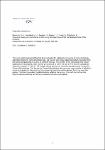Frequent foamy virus infection in free-living chimpanzees of the Taï National Park (Côte d'Ivoire)
Morozov, Vladimir
Leendertz, Fabian
Junglen, Sandra
Boesch, Christophe
Pauli, Georg
Ellerbrok, Heinz
Foamy viruses are frequently found in non-human primates and apes in captivity. However, data on simian foamy virus (SFV) infection in apes from the wild are limited. Necropsy specimens were collected from 14 West African chimpanzees (Pan troglodytes verus) from three communities in the Taï National Park, Côte d'Ivoire. PCR analysis revealed SFV-related int- and env-specific sequences in 12/14 chimpanzees. Two young chimpanzees were not infected. Plasma from 'PCR-positive' chimpanzees reacted against Pr71/74(gag) in Western blot analysis. Phylogenetic analysis demonstrated clustering of all analysed sequences with SFVcpz previously identified from the other P. troglodytes verus, although interestingly the sequences were diverse and no grouping according to a particular animal community was observed. The body compartments of two infected animals were examined and found to contain SFV sequences. Frequent SFV infections in chimpanzees from this area significantly increase the potential risk of zoonotic transmission to rural populations through direct contact, hunting and consumption of bush meat.
No license information

